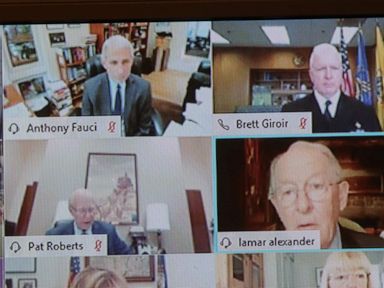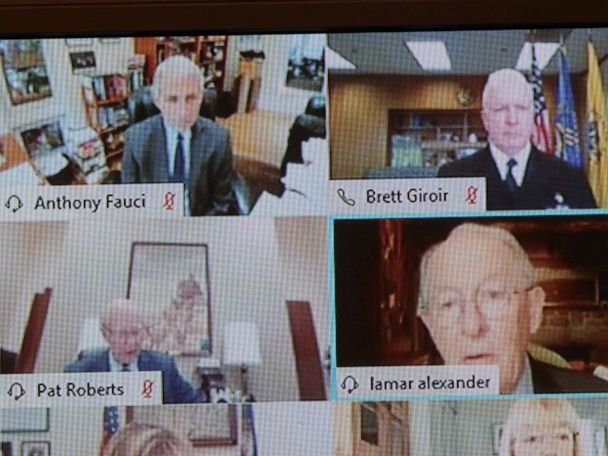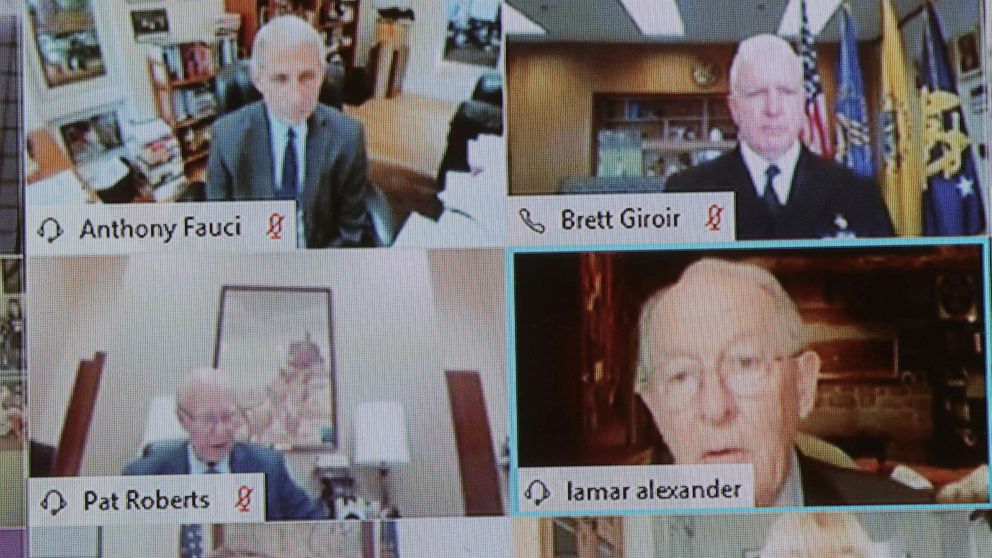





The nation got a few answers on when life might return closer to normal, as America’s top health officials warned Tuesday that there’s still much that scientists don’t know about the novel coronavirus, including its impact on children.
Testifying remotely via video before the Senate were Anthony Fauci, director of the National Institute of Allergy and Infectious Diseases; Stephen Hahn, head of the Food and Drug Administration; Robert Redfield, director of the Centers for Disease Control and Prevention, and Brett Giroir, an assistant secretary in the Department of Health and Human Services who is leading a national effort on testing.
Tune into ABC at 1 p.m. ET and ABC News Live at 4 p.m. ET every weekday for special coverage of the novel coronavirus with the full ABC News team, including the latest news, context and analysis.
Here are five things to know about their testimony on when schools and businesses might reopen.
Fauci warned of ‘suffering and death’ if states reopen too soon
Fauci, the nation’s top infectious disease expert, sternly warned lawmakers that their home states will trigger an outbreak and set back their economic recovery if they move too soon to reopen schools and businesses.
He repeated his plea for states to follow general guidelines that call for areas to reopen slowly, and only if cases decline for 14 days. Many states have pushed back on the recommendations and reopened without following them, which Fauci said was a bad idea.
“There is a real risk that you will trigger an outbreak that you may not be able to control,” he said.
What’s more, he added, is that the resulting “suffering and death” could “even set you back on the road to trying to get economic recovery.”
Sen. Paul went after Fauci, and Fauci pushed back
Following Fauci’s repeated warnings about opening schools and businesses too soon, it became clear that at least one senator was running out of patience.
Sen. Rand Paul, a Kentucky Republican who was the first senator to test positive for the virus, called it a “huge mistake” not to let kids return to school sooner and called the virus “relatively benign” outside of New England.
“I think we ought to have a little bit of humility in our belief that we know what’s best for the economy and as much as I respect you, Dr. Fauci, I don’t think you are the end-all,” Paul said.
Fauci pushed back, insisting his advice is based on science and is not on the economy. And, he said, humility was needed when considering how the virus might impact children.
“I’m very careful and hopefully humble in knowing that I don’t know everything about this disease, and that’s why I’m very reserved in making broad predictions,” Fauci said.
Paul was undeterred, later telling reporters, “We need more people saying, ‘Enough is enough. Leave us alone.’”
The federal government claims it can dramatically ramp up testing to some 50 million per month
Even as President Donald Trump has downplayed the role testing will play in reopening America, several lawmakers said they want widespread access.
Giroir, the HHS official who took a lead on testing, said by September, the U.S. will be capable of performing between 40 million to 50 million tests per month.
He wouldn’t say though if that scale would be enough to reopen schools, saying that would depend upon a community’s situation. And Redfield and other officials said they weren’t prepared to offer more specific guidance than what the federal government has already offered.
“We know that the testing needs will go up over May and June as we progressively open, and we will do our best to predict” the amount of tests needed, Giroir told senators.
Overall, Giroir said, the goal is making “as many tests available” to states if they want them.
Still, classes this fall are not a guarantee
Nearly every lawmaker wanted to know about schools. Sen. Lamar Alexander, R-Tenn., the panel’s chairman, asked when his state college students might feel comfortable returning to classrooms, while the committee’s top Democrat, Patty Murray of Washington, wondered how kids could pile on to school buses and eat in cafeterias.
Wouldn’t widespread testing help reopen the nation’s college campuses and schools?
Sen. Alexander said scaling up to 50 million tests per month should give every principal and college chancellor “some reassurance.”
But one issue with testing that health officials have noted is that a person can carry the virus without exhibiting symptoms, and testing only determines whether a person poses a risk at that particular point in time.
At one point, Fauci noted that a vaccine won’t likely be ready by fall and that effective treatments remain elusive. But he later clarified that cases in a region and its ability to handle an outbreak — not the availability of a vaccine — is a bigger factor in determining whether a school should reopen.
“It would depend on the dynamics of the outbreak in the region where the school is,” he said.
Fauci defends Obama, and Trump
Utah GOP Sen. Mitt Romney, who voted in favor of impeaching the president earlier this year, sought to get Fauci on the record about whether former President Barack Obama was to blame for the lack of a vaccine.
Trump has repeatedly blamed Obama for problems with the national stockpile and insisted he inherited his predecessor’s mess, despite spending three years in office before the pandemic hit.
“No, senator. Not at all. Certainly President Obama nor President Trump are responsible for our not having a vaccine,” Fauci replied.
Fauci also denied having a confrontational relationship with the president and said he provides Trump his best advice based on science.
“He hears that. He respects it,” Fauci said.
“He gets opinions from a variety of other people. But in no way, in my experience over the last several months, has there been any confrontational relationship between us,” he added.

